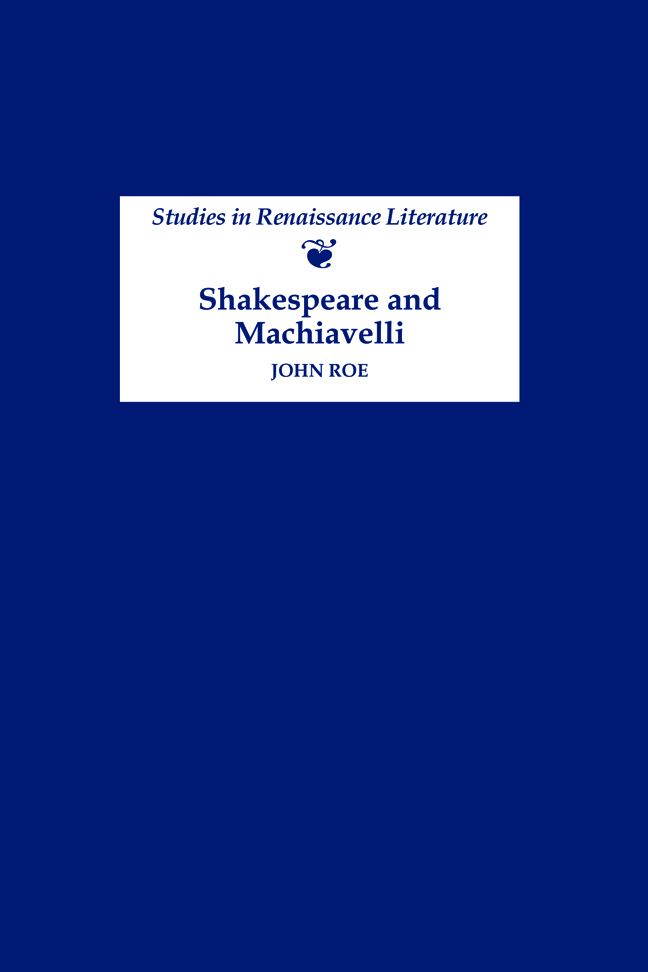Book contents
- Frontmatter
- Contents
- Acknowledgments
- Text and Abbreviations
- Preface
- Dedication
- 1 Shakespeare and Machiavelli
- 2 Richard II and the Bullingbrook Affair: Subtle Rhetoric and a ‘Silent King'
- 3 Henry V: The Prince and Cruelty
- 4 King John: Cruelty and the Action of Conscience
- 5 Julius Caesar: Conscience and Conspiracy
- 6 Antony and Cleopatra: Magnanimity and a Machiavellian Erotics
- Bibliography
- Index
6 - Antony and Cleopatra: Magnanimity and a Machiavellian Erotics
Published online by Cambridge University Press: 15 February 2024
- Frontmatter
- Contents
- Acknowledgments
- Text and Abbreviations
- Preface
- Dedication
- 1 Shakespeare and Machiavelli
- 2 Richard II and the Bullingbrook Affair: Subtle Rhetoric and a ‘Silent King'
- 3 Henry V: The Prince and Cruelty
- 4 King John: Cruelty and the Action of Conscience
- 5 Julius Caesar: Conscience and Conspiracy
- 6 Antony and Cleopatra: Magnanimity and a Machiavellian Erotics
- Bibliography
- Index
Summary
ANTONY AND CLEOPATRA may not strike us immediately as a play that lends itself to interpretation along Machiavellian lines. Understandably, despite the political arena in which it conducts its actions, it has commanded attention principally as the last of Shakespeare's great tragedies of love. We habitually regard the erotic as inimical to politics, and the great majority of approaches to the play conceive of Antony as relinquishing his hold on power by subjugating his will to that of the charming Cleopatra, to his eventual cost in the battle for empire. Critics, then, either interpret the play as a painful study in evasion, the preference of illusion over ineluctable temporal exigency, or conversely – especially those of a more traditional school – as the triumph of sensibility over the mean-minded constraints of ambition (in Dryden's phrase, ‘the world well lost’). Neither of these opposing approaches sees the play as a demonstration of the political integrated with the erotic, though I think it may be appropriate to do so.
Via its hero and heroine, the play contemplates the relationship of virtù (Antony) to fortuna (Cleopatra), which often though not invariably Machia- velli conceives of as a conflict, particularly in Il Principe. How Antony and Cleopatra perform vis-à-vis one another on the virtù-fortuna axis has significance for the play as a whole. Yet another Machiavellian concept which has important bearing on the action and theme of Antony and Cleopatra is that of magnanimity which, in this most expansive of all of Shakespeare's tragedies, characterizes both of the major figures. As we know already, grandezza dello animo, which Machiavelli often applies in its ancient sense, may encompass diverse or opposing meanings, from selfless generosity to self-serving cruelty and ruthlessness. Comparing Shakespeare's under- standing of the term with that of Machiavelli will take us once more into the republican arguments of the Discorsi, as well as obliging us to extend our discussion briefly to assess that other great Roman example of magnanimity, Coriolanus.
Machiavelli treats the erotic in only a small number of works, these being principally his dramas, the Mandragola and the Clizia. Commentators have from a very early period in productions of the former expressed reserva- tions at the apparent cynicism with which the theme of adultery is presented. Young Callimaco is enamoured of Lucrezia (a name famously emblematic of married chastity), who is the wife of Messer Nicia.
- Type
- Chapter
- Information
- Shakespeare and Machiavelli , pp. 170 - 207Publisher: Boydell & BrewerPrint publication year: 2002

